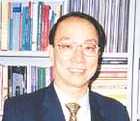![]()
Gear Up | Winning Words
Broaden Your Network | Learners' Light | Enrich Your Readings
On Education
On Education - Interviews with professors and department heads cover the hottest courses available at the eight higher education institutions and the resulting career opportunities.
|
Don't fall behind!
by Carole Ho
As Hong Kong is gradually becoming a knowledge-based society, an increasing emphasis on life-long learning is apparent in many sectors of the local economy. Those already in the workforce or out of a job, not excluding recent tertiary-level graduates, are sometimes in a quandary over when and how to start an effective life-long learning process. Dr Peter Fong, Principal Programme Director with The University of Hong Kong School of Professional and Continuing Education (HKU SPACE) says students should not take long to join the life-long learning process least they fall behind. He warns: "[These days,] the renewal of knowledge is rapid and drastic. In professional jobs it occurs about every five years. Knowledge expansion in certain industries like information technology, electronic engineering, and business management perhaps proliferated even more than in other [fields]. Dr Fong believes the process should start right after students complete their formal education, which, in present-day Hong Kong, is commonly defined as a first degree. However, formal education is not a necessary prerequisite for life-long learning. At least 10 different professional institutes in Hong Kong offer continuing professional development through various training courses to students of different levels of education and background. Most life-long learners' objective is career advancement through acquiring further skills. A wide range of methods is available, depending on the student's background. Most university graduates prefer to enroll in post-graduate courses. Those who have no time to attend regular courses have to resort to other methods, such as reading, on-the-job learning, and conference attendance. These can also widen the participants' knowledge base and provide valuable experience. Life-long learning seems overwhelming and endless. Dr Fong advises candidates to narrow the field by defining their objectives. He says: "Learners should first consider what their career goals are. Career goal setting could begin as early as primary-school age. But, career and life expectations change as learners mature into adulthood. The goal-setting exercise is a progression of establishing aims at different ages. The critical task is to ensure that goals are realistically set." It is not an easy task to identify the study focus. Learners must formulate a core area of knowledge and skills that should be learned to achieve their goals. Prioritization and focusing on "what must be learned, what should be learned, and what is nice to learn" are important in the life-long learning process to obtain effective results that can contribute to career success.
Dr Fong says, "Today, jobs usually require integrated, comprehensive, and involved concepts that have to be learned from multi-disciplines." The importance of on-the-job learning often does not get enough recognition, yet it is an important and perhaps the longest part of the life-long leaning process. On-the-job learning opportunities are constantly available. A motivated person can continuously discover and absorb new information and skills. This usually means asking the right questions at the right time of the right people. According to Dr Fong, "Action Learning" occurs when a large part of the job requires solving problems with only a small area of prior knowledge used. Probing questions offer opportunities to learn and simultaneously, through reflection, observation, and conceptualization, learners can enhance their problem-solving skills. Reading should not be neglected. Most professional fields are affiliated with some type of organization. These organizations produce regular issues of journals or newsletters that can be easily located in libraries and at the workplace, containing articles that help individuals stay abreast of changes in their field. Trade journal publications provide information about specific industrial groups' achievements and concerns. One should also refer to these journals and newsletters for information on professional activities such as meetings, conventions, conferences, and workshops. By attending these activities, learners can increase their exposure in their field and learn about new products, latest techniques and skills. Dr Fong emphasizes, "The outcome of learning must be measurable." The success of life-long learning in a practical sense can be measured with the individual's career success. KSA, namely knowledge, skills, and attitude refined by reading, observation, and questioning are the main factors leading to success. Appropriate work attitude not only includes motivation, determination, commitment, eagerness and drive, but also being positive and lively. Life-long learners do not have to live a solitary life. Dr Fong highly recommends "a balanced life through academic learning to increase knowledge and skills, social activities to create network, and physical exercise to maintain a healthy body and mind and reduce stress." Taken from Career Times 2002/10/18 |
|||||
(21-30 of 68)
Turning to psychology at a time of change
(2003/03/07)
Concurrent engineering - an indispensable technique for management professionals
(2002/12/06)
Engineering specialists to mix technology with business study
(2002/11/29)
MBA students go global from home
(2002/11/22)
Mastering a new language in jewelry design
(2002/11/15)
Chinese medicine : high requirements
(2002/11/08)
Admission to top school is the first challenge on road to professional success
(2002/11/01)
A new key to investing in China
(2002/10/25)
Don't fall behind!
(2002/10/18)
Financing education
(2002/10/11)
(21-30 of 68)


